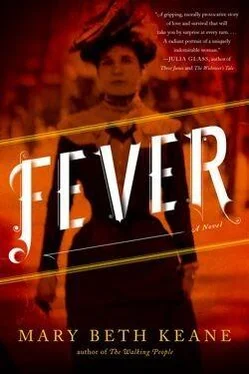“Yes. Fine.”
Mrs. Borriello named her price. It was more than at Mrs. Post’s, and it meant Mary would save nothing. Not a single dime unless she ate less, or washed her hair less often, or walked everywhere she went, or picked up another job for Sunday afternoons. If I offer less, Mary considered, she will take it. She said herself that she doesn’t want to advertise.
“Yes,” Mary said instead. “I can do that.”
Mrs. Borriello seemed surprised for a moment, and then happy. She waved over the boy. Mary shook the other woman’s hand, and then the boy’s. Each paid for her fruit, and they made their separate ways until the following Sunday, when Mary would move in.
She had not given a single thought to the others in the building when she’d made the suggestion to Mrs. Borriello, but when she walked away, and realized what had just been arranged, it felt again like time was moving backward, and that no matter how hard she tried to keep her eyes pointed to the step ahead, she kept getting knocked off balance, turned around.
She gathered her belongings from Mrs. Post’s when most of the others were out. It was only natural to feel that she was going home. Only when she saw the number hanging over the door — the dark entryway, the worn staircase beyond — did she truly understand what she’d done. At the bottom of the stairs was the same faded mural of a man on a horse, children picking fruit from trees. The plaster molding that had long ago been painted to match the wood of the banister had been chipped away further, and sat along the baseboard in small piles of dust. After so many months of avoiding the place, of swinging wide so as not to run into anyone, there she was the prodigal daughter without a thing to show for herself except for a scorch burn on her wrist, and swollen ankles, and a set of ten raw knuckles. They would laugh at her. She imagined Patricia Tiernan standing smug in her kitchen, saying what she always thought, what she always knew, while her fawning family gazed at her and nodded. She thought of the others who had never liked her, had never liked Alfred, and then how she and Alfred had thumbed their noses at what the others liked and didn’t like.
But now she was back, alone, and for the few seconds it took her to cross the landing she thought about returning to Mrs. Post’s, or to a boardinghouse, or asking if she could stay at the laundry for a week until she could find better accommodations. Everything about the place was familiar: the sag in the center of each stair, the smell of damp rising from the basement. If she were still cooking, she could have afforded their sixth-floor rooms on her own. Who lived there now? She thought of her old bed, her table, her sink, the spices she kept in the press.
She began to climb the stairs. When she got to Mrs. Borriello’s and knocked, the door opened immediately, and Mrs. Borriello took her bag and placed it under the cot, which was set up with pillows against the wall during the day to look like a small sofa. She nodded at Mary to sit. As soon as Mary pulled in her chair Mrs. Borriello served her coffee with sweet condensed milk and fresh bread with salted butter. At the center of the table she placed a bowl of fat, ripe blackberries. Mrs. Borriello sat across from her boarder and the two women ate and sipped and enjoyed the silence. It was the most delicious meal Mary had tasted since before North Brother.
“I want to thank you—” Mary began, but discovered a blockage in her throat that the words couldn’t skirt by. There was nothing to cry about, but the pressure behind her eyes was too much, and Mrs. Borriello was beside her, rubbing her back, saying that she must be tired, why not a short nap before the boys come? Mary agreed that she’d like to lie down for a few minutes, not sleep, but just lie down, close her eyes, pray to God that things would get better for her here and not worse. “Oh, first I want to give you this,” Mary said. “Yesterday was the first of the month, so it works out nicely.” She opened her bag and removed from her wallet the price they’d agreed on, but the other woman just looked at it on the table, at the bills Mary had fanned out, at the coins piled on top.
“Is it okay?” Mary asked. There was nothing else in her wallet if she owed more, if she’d misunderstood. She’d bought new wool tights that week, and twice in ten days, after closing the laundry with Li, she’d gone to the little counter that sold hamburger steaks until midnight. She knew she shouldn’t have done that. Once? Fine. But twice? And couldn’t the old tights have been mended?
Then Mrs. Borriello dipped her head and covered her face with her hands. “Yes, it’s okay,” she said after a moment. When she composed herself, she told Mary that she was going to her room to lie down, too.
• • •
Mary knew that avoiding her old friends now would make everything worse. It would be better to seek them out immediately, try to explain to them what had happened, let them see her face. Her silence from North Brother would be easier for them to understand than why she hadn’t sought them out since her release. Joan was no obstacle — she’d already forgiven Mary by the time she’d flagged her down on the sidewalk. Little Dorothy Alice cried in the mornings and over the sound of her wailing came Joan’s soothing voice, singing about doggies, or sleigh rides, or the Kingdom of Heaven. Later, walking to work, Mary found herself humming along.
There was Patricia Tiernan, who’d never liked Mary. Ever since Mary came back Patricia seemed shocked to see her making her way up the stairs. “Oh, hi, Mary,” Jimmy Tiernan said to her as they passed one evening, and just like in the old days Patricia appeared on the landing above them and looked as if she would choke him with her mind if she had the power.
As for Fran, the first time Mary saw her after returning to the building, her old friend was cool. She returned Mary’s greeting, and then continued up the stairs while Mary looked after her, feeling like she’d been slapped. After a few days, Mary worked up the courage to knock on her door. “Please, Fran, can’t I come in?” It might have been the “please” that melted the frost. Fran opened the door and Mary took her usual chair while Fran hunted for something sweet for them to eat.
“Why didn’t you come see us, Mary? I was sick when they sent you back to North Brother after the hearing. We had no idea you were released, and then Joan said she ran into you on the street. You could have stayed here. Why didn’t you just ask? You didn’t have to go to a boardinghouse. You didn’t have to go up there and pay Mrs. Borriello for a corner of her kitchen. I don’t even understand what happened.”
“I don’t know,” Mary said, and it was true: now that she was sitting there, looking at her old friend, she couldn’t remember why she let it go so long. “Why didn’t you come to my hearing if you were following the case? Alfred was there. And I didn’t hear from you after, either.” She could see on Fran’s face that it had never occurred to her, and Mary never expected Fran to give up an entire day sitting in a stuffy courtroom, but it was the only way to get past these small hurts — to answer with another hurt. You’ve been injured? Well, so have I.
“I didn’t know I could have gone to the hearing. I thought it was just lawyers and reporters. And you know I’m not a good writer. Sure, Robert said he’d take down a letter for me, but you know how that goes. You could have written to me more often, too.”
“You’re right, Fran. I don’t know why I said that. I’m sorry. It’s just that Alfred—”
Fran leaned forward. “I knew it was Alfred. You didn’t want to run into him here.” Fran asked her if she’d seen him in the week since she moved back.
Читать дальше












